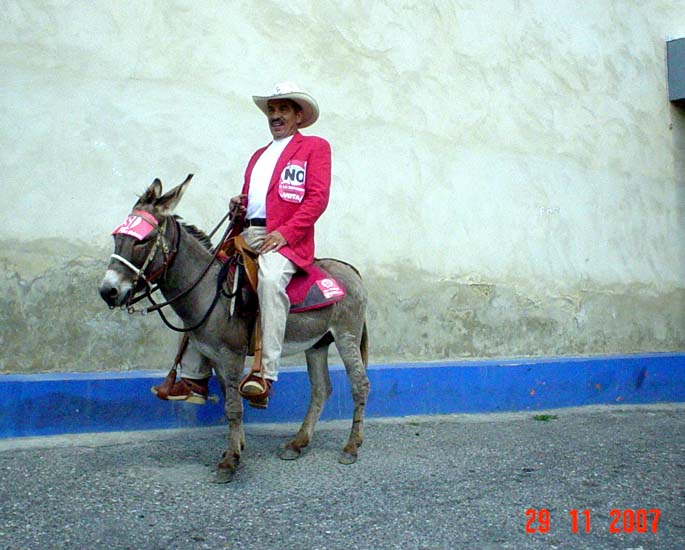|
Home |
|
|
|
|
May 25, 2008 Term LimitsA fellow Fool ask on the Motley Fool discussion boards: If the Venezuelan people could vote down the change to term limits, they could also vote out Chavez or any other candidate after one or two terms. Good question! I was having a discussion with my neighbor about Venezuelan politics and I also used Japan as an example. My argument went as follows: "Japan has managed to replace the military with the merchant class as the ruling power, why can't we do the same?" The reply was the relative size of government. Venezuela has the world's sixth largest oil reserves. Oil belongs to the government (in the name of the people hahaha!). Oil is our largest source of foreign funds. The Venezuelan government is our largest employer. It controls not only oil but the hydroelectric system that lights up the country. According to our constitution all mineral rights belong to the government (in the name of the people hahaha!). This includes bauxite, iron ore, gold, and coal among other goodies we have. And the de-facto owner of all this is the Venezuelan president. You can see how Chavez hands out money left and right to his fellow revolutionaries instead of using it to help our own nation. Once elections are over, politicians simple forget about the voters until a few months before the next election. The American Founding Fathers were very forethoughtful when they included so many checks and balances into the American system. A two house congress, for example, slows things down so that ideas can be better evaluated. One of the reforms of the first Chavez constitution was the replacement of the two house congress by a single house National Assembly. I could go on but it would be raining on wet ground as we say. Term limits are our equivalent of checks and balances. The party in power simply has so much power that they can rig and buy elections. Yon Goicoechea's merit was precisely that he neutralized the government's power by having students visit the poor neighborhoods to explain to the people, in simple terms they could understand, the implications of the proposed constitutional reform. Without this activity the referendum would have been a match between two cheerleading groups with no intellectual input whatsoever. It would have been "I love Chavez" vs. "I hate Chavez." Not the best platform to run a country on. But this is what any government in power tries to do, to hog TV and radio airtime with their fabulous resources. To bus voters to the polling stations. To threaten to fire public employees if they don't vote "right." Remember, the government is our largest employer and if someone is blacklisted, getting a job is next to impossible. The same happens to government contractors. This picture is a good description of the constitutional reform referendum without the student intervention: "Yes," vs. "No":  Our 40 years of so called democracy was mostly a sham but we were working on improving it. We were achieving a certain measure of decentralization which means that power was moving from the center to the localities, to the voters. Party power was decreased by improvements to the electoral laws. Maybe in a 100 years we would have arrived at a working democracy. Slowly but surely. Unfortunately some people were in a hurry and democracy cannot be sped up, it takes its own time to improve itself. I had a big argument with a friend of mine who, remembering the benign dictatorship of Marcos Perez Jimenez, wanted a military coup to replace our inept and corrupt politicians. Be careful with what you wish: He got Chavez! Here is an essay I wrote on the subject a couple of years ago: Uslar Pietri, Venezuelan Democracy's Undertaker Denny Schlesinger |
|
|
|
|
Home |
Top |
|
Copyright © Software Times, 2000, 2001, 2003. All rights reserved |
|